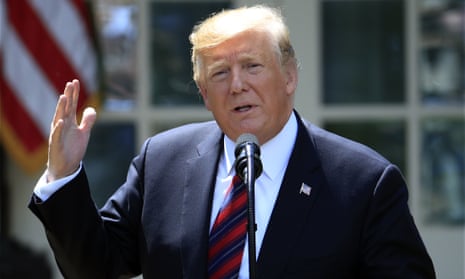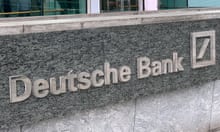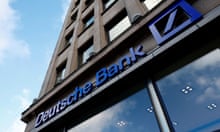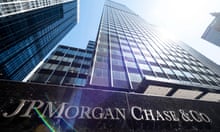Deutsche Bank’s drastic retrenchment marks the latest chapter in a dramatic fall from grace for a bank that was riding high until the banking crisis struck in 2008. Here’s how the 149-year-old bank ran into trouble.
1989-99: The plan to build a global bank
The Frankfurt-based lender embarks on a period of global expansion, beginning with the acquisition of blue-blooded merchant bank Morgan Grenfell in the UK.
Capitalising on the rapid pace of globalisation, it pushes into European markets such as Spain, where it buys Banco de Madrid. Acquisitions are part of its ambition to become a major player in investment banking.
It consolidates its US operations into one, in an effort to take on the big beasts of Wall Street such as Goldman Sachs, and in 1999 it builds on its US foothold by snapping up New York-based Bankers Trust for $10bn (£8bn).
2001: Joins the New York Stock Exchange
Deutsche Bank floats on the New York Stock Exchange, cementing its position as one of the major players, not just on Wall Street but in global banking.
2004-08: Deutsche’s role in the subprime mortgage crisis
In the years leading up to the banking crash, Deutsche Bank is a leader in mortgage-backed securities, bundling up homeowners’ debt into huge packages and selling them on to investors. The bank continues to sell toxic mortgage-based investments even as the market turns south and it begins betting against such products itself.
A key character in The Big Short movie about the sub-prime scandal – played by Ryan Gosling – was based on a Deutsche Bank trader who was enabling investors to bet against the very market in which Deutsche was involved.
In 2008 the bank reports its first annual loss for five decades , losing €3.9bn. “We have made mistakes, as everyone did,” said chief executive Josef Ackermann.
2009: Using private detectives
An internal investigation finds that the bank hired private detectives to spy on people it considered a threat to the bank – including a shareholder, a journalist and a member of the public. German prosecutors find no evidence of criminal wrongdoing or that senior executives were involved.
2012: The first of four chief executives resigns
Deutsche’s boss Josef Ackermann, a Swiss banker, stepped down after a decade in the top job in May 2012. He was succeeded by joint chief executives Anshu Jain and Jürgen Fitschen, who resigned in the wake of the Libor scandal. A British banker, John Cryan, took over, but he left in 2018 having failed to get to grips with the bank’s problems. Deutsche’s shares lost more than half their value under Cryan as it struggled to return to profitability. He was succeeded by Christian Sewing, who said yesterday the bank had “no choice” in axing 18,000 staff.
2015-18: The bank paid huge fines for multiple misdemeanors
Deutsche is fined $2.5bn (£1.7bn) by US and UK regulators for rigging the key Libor interest rate. The bank was also ordered to fire seven employees and accused of being obstructive towards regulators in their investigations into the global manipulation of the benchmark rate. The fine is a record for Libor transgressions.
Quick GuideDeutsche Bank job cuts – what staff and analysts had to say
Show
Christian Sewing, Deutsche Bank's chief executive, told staff that the cutbacks were regrettable but inevitable: “We are making deep cuts. I personally greatly regret the impact this will have on some of you. In the long-term interests of our bank, however, we have no choice.”
An equities trader in New York predicted that the layoffs on the equities floor would be swift: “It’s obviously going to suck for a couple of years.”
One IT worker leaving their City of London office said the bad news was dished out briskly on Monday morning: “I was terminated this morning. There was a very quick meeting and that was it.”
An equities trader emerged from Deutsche Bank’s London offices and headed to the pub, saying: “I got laid off; where else would I go?”
Another equities trader in Hong Kong said their offices had been gripped by news of the layoffs: “There is hardly any work getting done today and folks are just mailing or calling friends or headhunters. Half of the floor is gone and others are just waiting to be called in. Some people are saying their byes even before being called in.”
A banker leaving the Hong Kong office confirmed that Deutsche had begun implementing the cuts on Monday: “If you have a job for me, please let me know.”
A Singapore banker who remains in his job questioned whether Sewing’s plan would revive Deutsche’s fortunes: “The biggest question for us is where do we go from here if we don’t offer the whole suite of products? Will clients stick with us or is the game over?”
Banking expert Philip Augar says Deutsche had bowed to the inevitable: “Their ambition was to challenge the Wall Street giants. And for about decade, it looked as though they’d pulled it off … They’ve been limping along for the last few years and I suppose this day had to come.”
Anke Reingen of Royal Bank of Canada said the restructuring was more radical than expected: “However, as the plan pushes the profitability improvement further out in time on our estimates, we see more value elsewhere in the sector. Maintaining our rating of underperform, speculative risk.” Graeme Wearden
The bank is fined a further $258m in the US for doing business with US-sanctioned countries like Iran and Syria.
As regulators continue to sift through the wreckage of the banking crash, Deutsche takes a large slice of the blame. In September 2016, its shares slump on news that the institution faces a $14bn charge over mis-selling mortgage securities in the US. It eventually reaches a $7.2bn settlement with the US Department of Justice.
In 2017 UK and US regulators fine Deutsche more than $630m after finding that the lender failed to prevent $10bn of Russian money laundering via “mirror trades”, which had no economic purpose and served only to transfer money covertly.
Last year New York financial regulators hand down a fresh fine, $205m this time, for “lax oversight” in the bank’s foreign exchange business between 2007 and 2013, when it was the world’s largest dealer in foreign currency.
2019: Dealings with Donald Trump
The US Congress issues subpoenas to Deutsche for documents related to the bank’s dealings with Donald Trump. The New York Times reports that senior Deutsche executives blocked employees from alerting the federal government about suspicious activity alerts linked to Trump and Jared Kusher in 2016 and 2017.
Deutsche was one of Trump’s biggest lenders, sticking by the real estate mogul when other US banks refused to lend after he went through a series of bankruptcies. Trump is thought to have borrowed at least $2bn from Deutsche with about $300m outstanding.
The bank’s entanglement with the Trump family dates back to the 1990s when Bankers Trust continued to lend to him when others had pulled out. In 2008 Trump claimed the financial crisis was an unforeseen event and refused to repay $330m to Deutsche, countersuing for $3bn compensation for Deutsche’s role in the crisis.
Trump and Deutsche’s commercial real estate division settled in 2010 but Deutsche’s private banking business continued to lend to Trump.
2019: A merger collapses
After struggling to recover from the financial crisis, Deutsche attempts to organise a merger with another troubled German lender, Commerzbank. The talks fell apart in April, scuppering plans for a bank that would have been the eurozone’s second largest. The German government had been in favour of the deal, but the two banks said the risks and costs were too great.
Deutsche said it would “review all alternatives” – and at the weekend Sewing announces 18,000 jobs cuts, 20% of its workforce, with the axe falling worldwide.










